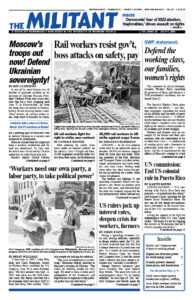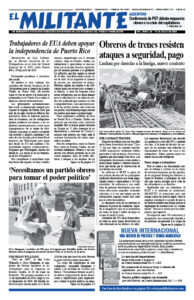LONDON — In the first national strike here by an industrial union in decades, 40,000 rail workers stopped work for three days last week. Striking members of the Rail, Maritime and Transport Union included station, signal, maintenance and track workers, and train crews. Halting work every other day, their action disrupted the rail network for a week. More strikes are planned.
The workers are fighting 13 rail operating companies, which have imposed a pay freeze on workers over the last two years, and Network Rail, the state-run company responsible for rail infrastructure, which refused any pay increase last year.
With U.K. retail price inflation running at over 11%, the rail bosses’ pay offer amounts to another wage cut. Network Rail has offered 3% if the union agrees to “efficiency savings,” such as treating Sundays as a normal working day.
Most rail workers already face shift schedules that are dangerous and disrupt family life. Rail bosses also plan to throw 2,500 workers out of their jobs.
Workers, unions support strike
“Our pickets have been well supported,” Clayton Clive, secretary of Manchester South RMT branch, told the Militant, “with up to 100 rail workers at the three picket locations around Manchester Piccadilly station at any one time — a real spread of all workers.”
The strikers’ fight is winning solidarity. A steady stream of passersby at the busy St. Pancras station in London expressed support, bringing water and snacks to strikers.
“I work in a nonunion workplace but I support the rail workers and any workers fighting to protect their living standards,” retail worker Jonathan Murdoch Scott said after delivering sweets to the strikers. “It’s not just about pay,” added Sami Scott, who works as a learning mentor in primary education. “They’re facing job cuts and worsened conditions too.”
Strikers picketing Piccadilly station have received solidarity delegations from postal workers, members of the Communication Workers Union, who are balloting for strike action to win higher wages; members of Unite, including bus workers who won an 11-week strike for better pay last year; meat workers with their union representative from the Pilgrim pork factory, members of the Community union; teachers and health workers, who are also set to ballot for strike action; and many others.
Pickets in Manchester carried a sign showing support for members of the International Brotherhood of Electrical Workers who are on strike at Canadian National. The RMT branch secretary has sent the Canadian rail workers a solidarity message.
The Financial Times reported a poll showing a majority of people consider the RMT’s strike justified.
Solidarity rallies have been held in London, Manchester, Bristol and elsewhere. The London rally was joined by two dozen hospital cleaners, members of the GMB union, on strike against contract company Mitie. “We face very similar attacks on wages and conditions,” striker Millicent Ford told the Militant.
Government figures reveal the vast majority of workers are getting wage raises below inflation, on average about 4%. Seven hundred British Airways workers at Heathrow airport are facing a similar cut to real wages and have also voted to go on strike.
Prime Minister Boris Johnson, Transport Secretary Grant Shapps and other ministers appear daily on TV, blaming striking workers for inflation by claiming higher wages will lead to an uncontrollable “wage/price spiral.” In addition, ministers say public sector workers will also be offered raises below the inflation rate.
Labour Party leader Keir Starmer opposes the rail strikes and said he would back below inflation rises for nurses, teachers and others.
The government announced May 26 one-off payments of up to 650 pounds ($798) to millions of workers hardest hit by the current crisis. It hopes this will prevent further union action.
“Workers don’t want Chancellor Rishi Sunak’s one-off bribes but wages that protect against inflation,” said Pete Clifford, a Manchester rail worker, union activist and leader of the Communist League. Clifford just won his job back after a union-led fight against his sacking by bosses at Carlisle Support Services.
“Every union-negotiated pay deal should include automatic cost-of-living rises,” Clifford said. “The government’s talk of a wage/price spiral is a cover for what the bosses really don’t like — wage rises that eat into their profits. Rising inflation is not caused by workers’ wage demands, but by the bosses’ profit system. What scares the rulers is that a victory for the RMT would inspire other workers.”

